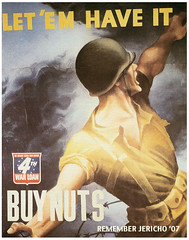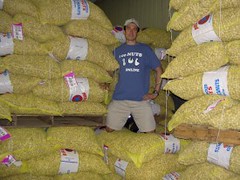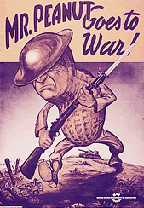Rarely have I have worked on a communication case study for the Copywrite, Ink. blog that so clearly galvanizes an audience as the CBS cancellation of Jericho. Sure, we’ve covered a few under-reported stories that have caught the attention of hundreds of readers; some who stay on long after the specific story fades into obscurity. But the CBS Jericho story does not attract hundreds. It attracts thousands. It does not seem to be fade away, but rather grows stronger every day.
As Jericho fans have taken to publicizing our case study in social media and crisis communication, we’ve covered it on more consecutive days than any other topic. Why? Analytics alone demonstrate the value of this very smart audience. They read long, deep, and come from all over the nation (and world). Some have even taken to searching past communication posts, looking for ideas.
I’m not the only place they are looking. While I have not verified these facts, Jericho-On-CBS has published some startling numbers: Jericho was the most watched show for CBS online (450,000 hits a week); Jericho delivered the highest rating in a Wednesday time slot in seven years; and Jericho frequently beat the competition in its time slot despite going up against some tough contenders. (This does not even consider how many fans watched reality shows like American Idol live and then saved Jericho on their DVRs for later.)
If all this is true, then CBS Entertainment made a mistake claiming that the show had lost steam based on ratings. It seems more likely that Jericho simply didn’t fit into CBS’s new fall line-up, purported to be hipper and edgier than past efforts. From a branding standpoint (before the backlash), it makes sense. But from a customer-centric standpoint (after the backlash), it does not.
In some ways, I appreciate where CBS might have been coming from. Some of our colleagues and online associates have cautioned me (using my own words in fact) that quantitative measures (number of visitors) should not overshadow qualitative measures (number of prospects or regular reders). In other words, they’re wondering when I might get back to a broader mix of topics. I have something else planned for tomorrow, but I just don’t know. If something breaks on Jericho, then Jericho is it. Yes, again.
You see, as I learn more about the Jericho fans, they continue to amaze me in how well they’ve come together. One said I made them sound like geniuses, recognizing that public relations professionals and political consultants might be envious of their efforts. Sure, I know in many cases these fans stumbled unto some of it, but that’s just part of the American way. We stumble upon lots of things. More to the point, however, I like to believe that imagination is more important than knowledge and this case study might prove it.
CBS is using its knowledge to justify canceling the show. The fans are using their imagination to save it. The huge volume of orders for nuts, 9,000 pounds at last count, is only a sliver of the number of nuts sent as social media has embraced this story along with a growing number of mainstream media outlets, especially dailies, entertainment weeklies, and local CBS affiliates.
Given this news, I’m putting more even faith in the fans of Jericho, even if CBS has yet to realize it might do the same. Last night, after deadlines were met, my team put together the “Remember Jericho” image as a thank you to all the fans who have popularized our case study. And, we’ve added it to a few T-shirts in our almost-ready-for-primetime online merchandise store.
As a thank you to the fans, especially Jericho Lives and Jericho Rally Point, and to ensure I remain an communication observer (my family and many team members are big fans of the show; they are the ones who encouraged me to write about it to begin with), any proceeds beyond the base price set by Cafepress.com will be donated to the NUTS campaign. If the campaign should end, then we’ll donate it to an appropriate charity. I don’t want to detract from the funding efforts of our campaign elements nor do I want to want to make money on their efforts. (If I release a book by year’s end as planned, you can always consider that instead, as the Jericho story will be included).
The link to the Jericho T-shirts is at Back Lot Projects. Just a few tidbits about the shirt: it’s an adaptation of a vintage World War II war bonds poster, which we thought was fitting with Memorial Day almost weekend upon us and the all the patriotism that seems to surround the show. The ‘Remember Jericho 07’ line plays off another historic rally cry in American history (Remember the Alamo). But besides all that, it was fun to make.
In closing, if not every future post is Jericho focused, keep in mind that we track case studies for a long time, so there will always be another post unless we close it out. We’ll also keep adding updates in the comments. In the interim, if you are a fan and like the image, feel free to use it for non-commercial purposes.
Until then, good luck! And, what else? NUTS!

As Jericho fans have taken to publicizing our case study in social media and crisis communication, we’ve covered it on more consecutive days than any other topic. Why? Analytics alone demonstrate the value of this very smart audience. They read long, deep, and come from all over the nation (and world). Some have even taken to searching past communication posts, looking for ideas.
I’m not the only place they are looking. While I have not verified these facts, Jericho-On-CBS has published some startling numbers: Jericho was the most watched show for CBS online (450,000 hits a week); Jericho delivered the highest rating in a Wednesday time slot in seven years; and Jericho frequently beat the competition in its time slot despite going up against some tough contenders. (This does not even consider how many fans watched reality shows like American Idol live and then saved Jericho on their DVRs for later.)
If all this is true, then CBS Entertainment made a mistake claiming that the show had lost steam based on ratings. It seems more likely that Jericho simply didn’t fit into CBS’s new fall line-up, purported to be hipper and edgier than past efforts. From a branding standpoint (before the backlash), it makes sense. But from a customer-centric standpoint (after the backlash), it does not.
In some ways, I appreciate where CBS might have been coming from. Some of our colleagues and online associates have cautioned me (using my own words in fact) that quantitative measures (number of visitors) should not overshadow qualitative measures (number of prospects or regular reders). In other words, they’re wondering when I might get back to a broader mix of topics. I have something else planned for tomorrow, but I just don’t know. If something breaks on Jericho, then Jericho is it. Yes, again.
You see, as I learn more about the Jericho fans, they continue to amaze me in how well they’ve come together. One said I made them sound like geniuses, recognizing that public relations professionals and political consultants might be envious of their efforts. Sure, I know in many cases these fans stumbled unto some of it, but that’s just part of the American way. We stumble upon lots of things. More to the point, however, I like to believe that imagination is more important than knowledge and this case study might prove it.
CBS is using its knowledge to justify canceling the show. The fans are using their imagination to save it. The huge volume of orders for nuts, 9,000 pounds at last count, is only a sliver of the number of nuts sent as social media has embraced this story along with a growing number of mainstream media outlets, especially dailies, entertainment weeklies, and local CBS affiliates.
Given this news, I’m putting more even faith in the fans of Jericho, even if CBS has yet to realize it might do the same. Last night, after deadlines were met, my team put together the “Remember Jericho” image as a thank you to all the fans who have popularized our case study. And, we’ve added it to a few T-shirts in our almost-ready-for-primetime online merchandise store.
As a thank you to the fans, especially Jericho Lives and Jericho Rally Point, and to ensure I remain an communication observer (my family and many team members are big fans of the show; they are the ones who encouraged me to write about it to begin with), any proceeds beyond the base price set by Cafepress.com will be donated to the NUTS campaign. If the campaign should end, then we’ll donate it to an appropriate charity. I don’t want to detract from the funding efforts of our campaign elements nor do I want to want to make money on their efforts. (If I release a book by year’s end as planned, you can always consider that instead, as the Jericho story will be included).
The link to the Jericho T-shirts is at Back Lot Projects. Just a few tidbits about the shirt: it’s an adaptation of a vintage World War II war bonds poster, which we thought was fitting with Memorial Day almost weekend upon us and the all the patriotism that seems to surround the show. The ‘Remember Jericho 07’ line plays off another historic rally cry in American history (Remember the Alamo). But besides all that, it was fun to make.
In closing, if not every future post is Jericho focused, keep in mind that we track case studies for a long time, so there will always be another post unless we close it out. We’ll also keep adding updates in the comments. In the interim, if you are a fan and like the image, feel free to use it for non-commercial purposes.
Until then, good luck! And, what else? NUTS!





















